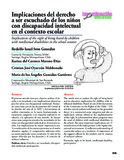Mostrar el registro sencillo del ítem
Implicaciones del derecho a ser escuchado de los niños con discapacidad intelectual en el contexto escolar
| dc.rights.license | http://creativecommons.org/licenses/by-nc-sa/3.0/ve/ | |
| dc.contributor.author | Soto González, Rodolfo | |
| dc.contributor.author | Moreno Díaz, Karina | |
| dc.contributor.author | Oyarzún Maldonado, Cristian José | |
| dc.contributor.author | González Gutiérrez, María de los Ángeles | |
| dc.date.accessioned | 2017-05-11T19:51:31Z | |
| dc.date.available | 2017-05-11T19:51:31Z | |
| dc.date.issued | 2016-09 | |
| dc.identifier.issn | 1316-4910 | |
| dc.identifier.uri | http://www.saber.ula.ve/handle/123456789/43411 | |
| dc.description.abstract | El presente artículo tiene por objetivo analizar el derecho a ser escuchado y sus implicaciones educativas para los niños con discapacidad intelectual. Tomando como base uno de los documentos del Comité de los derechos del niño de la ONU y herramientas de análisis cimentadas en la teoría fundamentada, se construyen categorías y un esquema explicativo en relación a la aplicación de este derecho. Se discute cómo estas categorías atienden las necesidades de los niños con discapacidad intelectual en el escenario escolar. Las implicaciones de mayor importancia son: 1) consideración de los asuntos presentes en el medio educativo regular; 2) comprensión suficiente sobre un asunto particular como condición; 3) valor de los apoyos ofrecidos por los docentes y 4) creación de culturas inclusivas. | es_VE |
| dc.language.iso | es | es_VE |
| dc.publisher | Saber-ULA | es_VE |
| dc.rights | info:eu-repo/semantics/openAccess | |
| dc.subject | Derecho a ser escuchado | es_VE |
| dc.subject | Discapacidad intelectual | es_VE |
| dc.subject | Participación | es_VE |
| dc.title | Implicaciones del derecho a ser escuchado de los niños con discapacidad intelectual en el contexto escolar | es_VE |
| dc.title.alternative | Implications of the right of being heard by children with intellectual disabilities in the school context | es_VE |
| dc.type | info:eu-repo/semantics/article | |
| dc.description.abstract1 | This article aims to analyze the right of being heard and its education implications for children with intellectual disabilities. Based on one of the documents of the Committee on the Rights of the Child – UN and also several analysis tools based on the grounded theory it is constructed some categories and also an explanatory schema related to the implementation of this right. It is discussed how these categories meet the need of children with intellectual disabilities in the school. The most important implications are: 1) consideration of the issues present in the regular educational environment; 2) sufficient understanding of a particular subject as a condition; 3) importance of the support offered by the teachers and 4) creation of inclusive cultures. | es_VE |
| dc.description.colacion | 565-576 | es_VE |
| dc.description.email | rodolfosotogo@gmail.com | es_VE |
| dc.description.email | karina.moreno.diaz@gmail.com | es_VE |
| dc.description.email | cristian.jose.oyarzun@gmail.com | es_VE |
| dc.description.email | m.angeles.gon@gmail.com | es_VE |
| dc.identifier.depositolegal | pp199702ME1027 | |
| dc.identifier.depositolegal | pp199702ME1927 | |
| dc.publisher.pais | Venezuela | es_VE |
| dc.subject.facultad | Facultad de Humanidades y Educación | es_VE |
| dc.subject.institucion | Universidad de Los Andes | es_VE |
| dc.subject.keywords | Right to be heard | es_VE |
| dc.subject.keywords | Intellectual disability | es_VE |
| dc.subject.keywords | Participation | es_VE |
| dc.subject.seccion | Educere: Investigación Arbitrada | es_VE |
| dc.subject.thematiccategory | Artes y Humanidades | es_VE |
| dc.subject.tipo | Revistas | es_VE |
| dc.type.media | Texto | es_VE |
Ficheros en el ítem
Este ítem aparece en la(s) siguiente(s) colección(ones)
-
Educere - Año 020 - Número 067
Septiembre - Diciembre 2016


